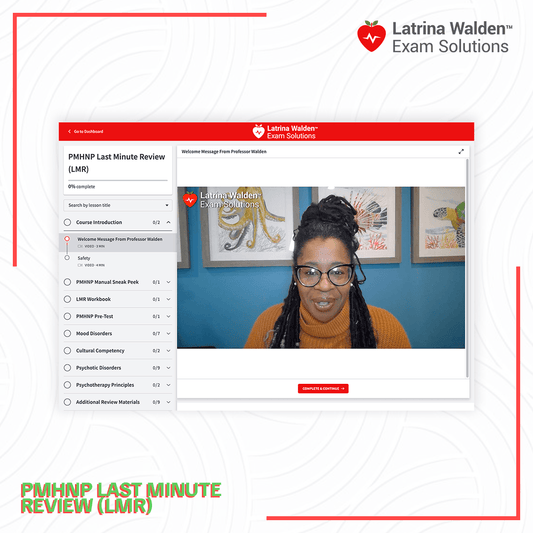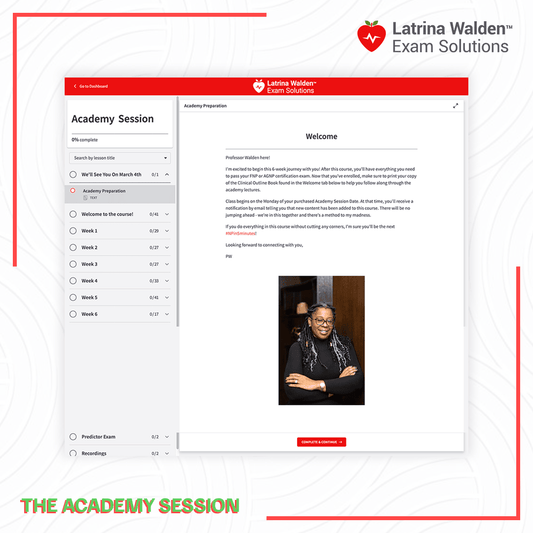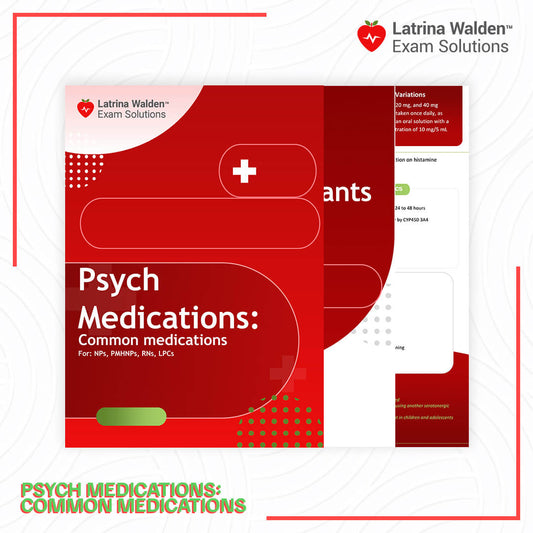Whether you’re trying to decide between the ANCC board certification exam and the AANP exam, or are already approaching your test date, having an understanding of what it takes to pass will ensure that you are not only well-prepared but confident in your ability to pass. In this guide, we’ve curated everything you need to know to confidently navigate the ANCC NP board exams. From understanding the exam format and content to ensuring that you’re qualified, we’re here to support you on your path to success.
Table of Contents
How is the ANCC Exam Different from The AANP Exam?
Eligibility Criteria
How the ANCC Exam is Scored
How Many Questions Are on The ANCC Exam
Content Areas of the ANCC Exam
Types of Questions on The ANCC Exam
How is The ANCC Exam Different from The AANP Exam?
Mental health nurses and PMHNPs are playing a critical role in addressing the nationwide ion
Eligibility Criteria
To be eligible to take the ANCC Exam, you must meet certain educational and clinical requirements that will have undoubtedly prepared you for the exam. Detailed criteria can be found on the ANCC website, but let’s review a summary of them below.
- Applicants must hold a current, active RN license in a state or territory of the US or the professional, legally recognized equivalent in another country.
- Applicants must have a master’s degree, post-graduate certificate, or DNP (Doctor of Nursing Practice) from an institution with a program accredited by the Commission on Collegiate Nursing Education (CCNE), the Accreditation Commission for Education in Nursing (ACEN), or the National League for Nursing (NLN) Commission for Nursing Education Accreditation (CNEA).
- Candidates must have taken three separate, comprehensive, graduate-level courses in advanced physiology/pathophysiology, advanced health assessment, and advanced pharmacology (the 3 P’s)
- ANCC requires coursework in health promotion and/or maintenance, differential diagnosis and disease management, and the use and prescription of pharmacologic and nonpharmacologic interventions.
- A minimum of 500 faculty-supervised clinical hours must have been completed.
How the ANCC Exam is Scored?
After you take your exam, a raw score is generated; this is the total number of correct answers. That score is then converted into a scaled score, and in order to pass, you must get at least a 350. The process of converting raw scores into scaled scores adjusts for the difficulty of the exam. Since different versions of the ANCC exam may have slight variations in difficulty, scaling scores ensures that candidates are scored fairly. This means that candidates who take different versions of the exam should receive comparable scores, reflecting their true level of knowledge and skill. Scaling ensures that the standard for passing remains consistent and fair, regardless of the exact content of the exam.
How Many Questions Are on The ANCC Exam?
The ANCC board exam is made up of 175 questions, but only 150 of these are scored. The remaining 25 questions are considered “pretest” questions, and are questions that ANCC is assessing for use on future exams. Note that they are not labeled any differently than regular scored questions. If you come across a question that is unlike any of the practice questions or material you’ve ever seen, there’s a good chance it’s a pretest question! We repeat: these do not affect your score!
Content Areas of The ANCC Exam
The ANCC NP board exam covers a comprehensive range of material that reflects the practice of nurse practitioners. This material is organized into five key categories: assessment, diagnosis, planning, evaluation, and implementation. ANCC also incorporates non-theory questions–topics such as culturally sensitive practices and research. These will be dispersed among planning, implementation, and evaluation. Let’s explore each of these areas in more detail.
Assessment
Assessment is a fundamental component of nurse practitioner practice. It involves systematically collecting and analyzing patient data to identify health problems, risk factors, and other relevant information. On the ANCC exam, the assessment questions will also cover population health promotion and screening, as well as genetic, behavioral, lifestyle, and cultural risk assessment.
Example: “Name the disease for which this population is at risk: thin, mostly women, post-menopausal, may or may not be a smoker. You should be thinking osteoporosis!
Diagnosis
The diagnosis domain assesses a candidate’s competence in identifying health problems, conditions, and diseases based on the assessment data. Candidates are required to demonstrate an understanding of pathophysiology, differential diagnosis, and the application of clinical guidelines. Accurate diagnosis is essential for developing appropriate treatment plans. In diagnosis questions, signs and symptoms will be given to you.

Planning
In this domain, candidates are evaluated on their ability to develop patient-centered treatment plans. This includes selecting and implementing appropriate interventions, prescribing medications, providing patient education, and setting realistic health goals. A well-structured plan is crucial for delivering effective care. These types of questions will often present you with a patient scenario or problem and ask you to determine the most appropriate next step in managing this patient’s condition. Potential responses can include ordering labs or diagnostic testing (imagine, procedures), prescribing medication, or referring your patient to another provider. To effectively answer these questions, you have to have a strong foundation in clinical knowledge and understanding the guidelines and evidence-based practice. Knowledge of first-line procedures, images, etc. is key.
Example: The question describes to you a patient who has peripheral artery disease (leg cramping, reduced growth of leg hair, and one foot that feels colder than the other). What is the plan for suspected PAD? You should be thinking that you need to send your patient for an ABI!
Evaluation
Evaluation questions focus on your ability to monitor and assess the effectiveness of care provided. They include tracking patient progress, adjusting treatment plans when necessary, and recognizing when referrals or additional interventions are needed. These questions may ask you to assess the result or outcome of a treatment that has been implemented. They will often describe scenarios in which you review lab results, assess changes in a patient’s condition, or consider feedback from a patient or another healthcare provider. On the ANCC exam, you should be able to identify barriers to care and modify your plan accordingly.
Example: A scenario is described in which a patient has iron-deficient anemia. They have been taking iron medication for 3 months, but lab values are not increasing. The question asks, “Did the iron work for your patient?” It did not, so there are two options to consider: either you have the wrong diagnosis, or your patient is not taking their medication. What intervention should you consider?
Implementation
The implementation genre of questions is not found on the AANP exam; it’s only on the ANCC board exam. These types of questions assess your ability to execute and manage patient care based on a formulated plan. It will evaluate your practical skills as well as your ability to deliver patient-centered care effectively, translating your theoretical knowledge and clinical reasoning into actionable evidence-based care. You’ll be tested on:
- Legal and ethical topics such as HIPAA and confidentiality
- Non-pharmacological interventions like procedures, splinting, biopsies, sutures, and imaging
- Pharmacological intervention selection
- Providing patient education or counseling
- Referrals
- Communication techniques
- The Nurse Practice Act
- Reportable diseases
Implementation questions will often ask “what do you do next?” You may not have experience in some of these areas unless you’ve worked directly in related fields. Not to fear! LWES offers questions to test on this and will ensure that you’re prepared.
Types of Questions on The ANCC Exam
The ANCC exam contains multiple question formats. Some questions are multiple-choice, but there is also a section with alternative question types such as drag-to-match, multiple select (also known as SATA questions or Select All That Apply), and “hot spot” (image-based) questions.











